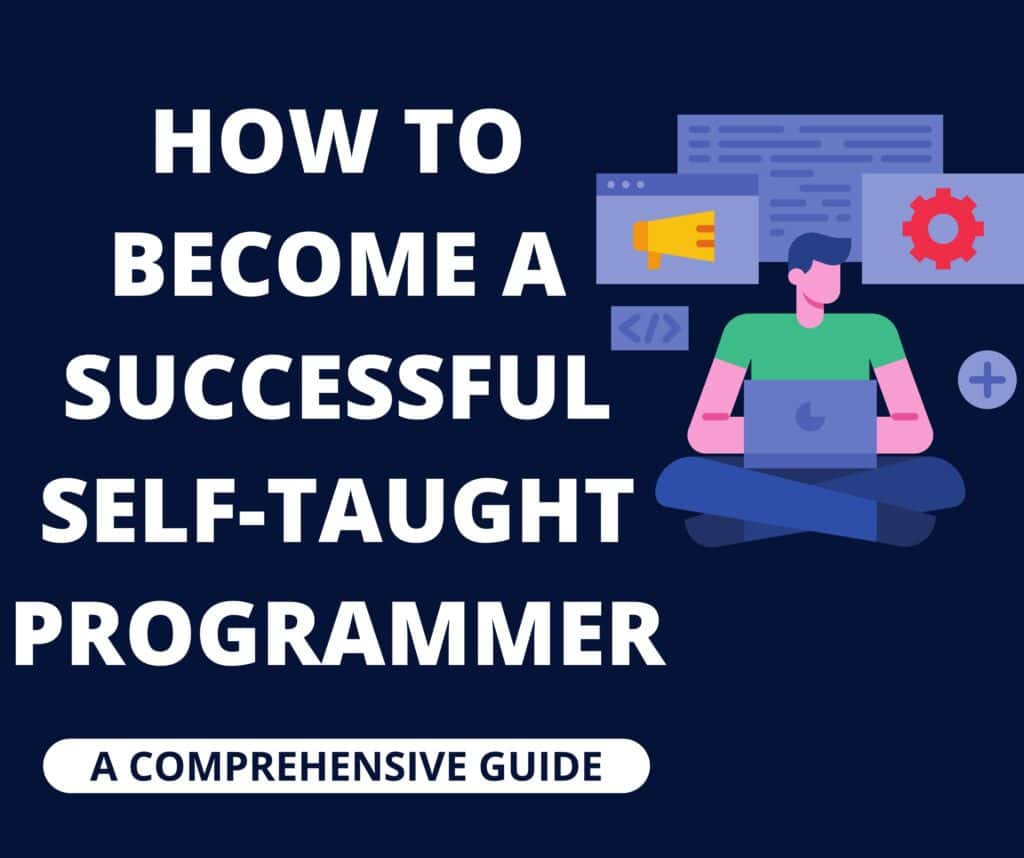In the rapidly evolving tech industry, programming skills are highly sought after, yet the traditional path of formal education is not the only route to becoming a proficient programmer. Self-taught programming refers to the process of learning to code outside of formal classroom settings, relying on various online resources, books, and personal projects. This approach allows individuals to acquire programming skills independently, without enrolling in a degree program or attending coding bootcamps.
Self-taught programmers often start their journey by exploring programming languages, tools, and frameworks on their own. They may use online tutorials, interactive coding platforms, and community forums to gain knowledge and practical experience. This method provides flexibility in learning pace and style, allowing individuals to focus on areas of interest and skip topics they are already familiar with.
Disclaimer: This post includes affiliate links. I may earn a commission if you make a purchase. These links provide access to valuable resources like free training and support for your online success.
Try Wealthy Affiliate (For Free).
Importance and Growing Trend of Self-Taught Programmers
The trend of self-taught programming has gained significant momentum in recent years, driven by several factors. First, the increasing availability of high-quality, affordable learning resources online has made it easier for individuals to learn programming on their own. Platforms like Codecademy, Coursera, and freeCodeCamp offer a wide range of courses that cater to different skill levels and interests, often at little to no cost.
Additionally, the demand for skilled programmers continues to rise across various industries. Companies are increasingly valuing practical experience and demonstrable skills over formal educational credentials. As a result, self-taught programmers who can showcase their abilities through projects and portfolios are finding ample opportunities in the job market.
The flexibility of self-taught programming also aligns with the dynamic nature of the tech industry. Traditional educational programs may not always keep pace with emerging technologies and industry trends, but self-taught learners can quickly adapt by exploring new tools and techniques independently.
Benefits of Learning Programming on Your Own
- Flexibility and Self-Paced Learning: One of the most significant advantages of being a self-taught programmer is the ability to learn at your own pace. Unlike formal education, which often follows a fixed curriculum, self-taught programming allows you to set your own schedule and focus on topics that interest you the most. This personalized approach helps in managing learning around other commitments, such as work or family.
- Cost-Effectiveness: Formal education and coding bootcamps can be expensive, with tuition fees sometimes reaching several thousand dollars. In contrast, many online resources, such as tutorials, eBooks, and forums, are available for free or at a low cost. This affordability makes programming education accessible to a broader audience, regardless of financial background.
- Personalized Learning Experience: Self-taught programmers have the freedom to choose their learning materials and methods. Whether you prefer interactive coding exercises, video tutorials, or hands-on projects, you can tailor your learning experience to suit your individual needs. This customization helps in retaining knowledge more effectively and applying it to real-world scenarios.
- Real-World Application of Skills: By working on personal projects or contributing to open-source initiatives, self-taught programmers can gain practical experience that directly applies to real-world situations. Building a portfolio of projects not only enhances coding skills but also demonstrates your capabilities to potential employers. This hands-on experience is invaluable in a field where practical skills often outweigh theoretical knowledge.
What is a Self-Taught Programmer?
Definition and Characteristics
A self-taught programmer is an individual who learns to code and develop software independently, outside of traditional educational institutions. Unlike those who pursue formal degrees or certifications in computer science, self-taught programmers rely on a variety of resources such as online tutorials, books, coding bootcamps, and hands-on projects to acquire their skills.
Ready to take the leap into online business? Click here to begin
Try Wealthy Affiliate (For Free).
Characteristics of Self-Taught Programmers:
- Independent Learning: They take charge of their own education, choosing what to study, when to study it, and how to approach learning new concepts. This autonomy allows them to tailor their learning experience to their own needs and interests.
- Resourcefulness: Self-taught programmers are adept at finding and utilizing various resources available online. This includes free or paid online courses, coding platforms, forums, and documentation.
- Practical Experience: They often focus on practical, real-world applications of their skills. By working on personal projects or contributing to open-source software, they gain hands-on experience that complements their theoretical knowledge.
- Self-Motivation: Learning programming on your own requires a high degree of self-discipline and motivation. Self-taught programmers must be proactive in setting goals, managing their time, and staying engaged with their learning process.
- Adaptability: The tech industry evolves rapidly, and self-taught programmers must be adaptable to keep up with new technologies, programming languages, and industry trends. Their ability to quickly learn and integrate new skills is a key characteristic.
Difference Between Self-Taught Programmers and Formal Education
The journey of self-taught programmers differs significantly from that of individuals who pursue formal education in computer science or related fields. Here are some key differences:
- Learning Structure: Formal education typically follows a structured curriculum with predefined courses, exams, and grading. In contrast, self-taught programmers design their own learning path, which can be more flexible but may lack the systematic approach of formal programs.
- Cost: Traditional degrees and certifications can be costly, often requiring significant financial investment. Self-taught programmers often use low-cost or free resources, making their education more affordable.
- Depth vs. Breadth: Formal education usually provides a comprehensive understanding of computer science principles, including theory and foundational knowledge. Self-taught programmers may focus more on practical skills and specific technologies, potentially skipping some theoretical concepts.
- Certification and Credentials: Formal education provides recognized degrees or certifications, which can be valuable for job applications and career advancement. Self-taught programmers may need to rely on portfolios, projects, and skills demonstrations to prove their expertise.
- Networking and Resources: Formal programs often offer networking opportunities, internships, and access to industry resources. Self-taught programmers may need to seek out these opportunities independently through online communities, meetups, and personal networking.
Examples of Successful Self-Taught Programmers
Many successful programmers and tech industry leaders started their careers as self-taught individuals. Their stories highlight the potential for success through self-directed learning:
- Steve Jobs: Co-founder of Apple Inc., Steve Jobs never completed his college education. His journey into programming and technology began with his curiosity and hands-on experimentation. His story is a testament to the power of passion and self-learning in achieving remarkable success.
- Mark Zuckerberg: The co-founder of Facebook started programming as a teenager, developing his skills independently before enrolling at Harvard. His early projects and self-taught programming skills played a crucial role in creating the social media giant.
- David Karp: Founder of Tumblr, David Karp was a self-taught programmer who began coding at a young age. His early work on various projects and his ability to learn and adapt contributed to his success in building a popular platform.
- Chris Wanstrath: Co-founder of GitHub, Chris Wanstrath is another example of a successful self-taught programmer. His journey involved learning programming through practical experience and community involvement, eventually leading to the creation of a major platform for developers.
Benefits of Being a Self-Taught Programmer
Flexibility and Self-Paced Learning
One of the most significant benefits of being a self-taught programmer is the flexibility it offers. Unlike traditional educational settings, which follow a strict schedule and curriculum, self-taught programmers have the freedom to learn at their own pace. This flexibility allows learners to:
- Set Their Own Schedule: Self-taught programmers can choose when and how often they study. This is particularly beneficial for those who have other commitments, such as full-time jobs or family responsibilities. They can dedicate time to learning during evenings, weekends, or whenever it fits their schedule.
- Customize Learning Depth: Learners can focus on specific areas of interest or importance to their career goals. If a particular topic or technology is crucial for their projects or desired job roles, they can spend more time on it, while skipping over less relevant material.
- Adjust Learning Speed: Self-taught programmers can progress through material at a speed that suits their understanding and comfort level. If they grasp a concept quickly, they can move on to more advanced topics sooner, whereas they can spend additional time on challenging areas without feeling pressured.
Create a new income stream today. Start your journey here
Try Wealthy Affiliate (For Free).
Cost-Effectiveness Compared to Formal Education
Self-taught programming can be significantly more cost-effective than pursuing formal education. Here’s how:
- Lower Financial Investment: Traditional degrees and coding bootcamps can be expensive, with tuition fees sometimes reaching thousands of dollars. In contrast, many self-taught programmers utilize free or low-cost resources. Online platforms like freeCodeCamp, Coursera, and Khan Academy offer high-quality education at little to no cost.
- Reduced Expenses for Learning Materials: While formal programs often require purchasing textbooks and other materials, self-taught learners can access a vast array of free online resources, including eBooks, video tutorials, and coding practice sites.
- No Additional Costs for Certifications: Formal education often involves additional costs for exams and certifications. Self-taught programmers can focus on building a portfolio of projects to showcase their skills to potential employers, avoiding these extra expenses.
Personalized Learning Experience
Self-taught programming allows for a highly personalized learning experience, tailored to individual needs and preferences:
- Customized Learning Path: Learners can choose which programming languages, frameworks, and tools to study based on their specific interests and career goals. This level of customization ensures that their learning is directly relevant to their desired field of work.
- Adaptable Learning Methods: Self-taught programmers can select learning methods that best suit their learning style, whether that’s interactive coding exercises, video tutorials, or hands-on projects. This adaptability helps in retaining information and staying engaged.
- Focused Skill Development: By setting their own goals and priorities, self-taught programmers can concentrate on acquiring skills that are most valuable for their personal and professional aspirations. They can spend more time on emerging technologies or areas of interest that might not be covered in traditional curricula.
Real-World Application of Skills
Self-taught programmers often gain practical, hands-on experience that is highly applicable to real-world scenarios:
- Building a Portfolio: Working on personal projects allows self-taught programmers to create a portfolio that demonstrates their skills and creativity. This portfolio can be a powerful tool when applying for jobs or freelance opportunities, showcasing tangible evidence of their capabilities.
- Contributing to Open Source: Many self-taught programmers contribute to open-source projects, gaining valuable experience and collaborating with other developers. This not only enhances their skills but also helps in building a network within the programming community.
- Problem-Solving Experience: By tackling real-world projects and challenges, self-taught programmers develop problem-solving skills that are crucial in a professional setting. They learn to troubleshoot issues, optimize code, and adapt to new technologies, all of which are essential for success in the tech industry.
Challenges Faced by Self-Taught Programmers
Lack of Structured Guidance
One of the primary challenges faced by self-taught programmers is the absence of structured guidance. Unlike formal education, where curricula are carefully designed and instructors provide oversight, self-taught programmers must navigate their learning journey independently. This can lead to several issues:
- No Predefined Learning Path: Without a structured curriculum, self-taught learners may struggle to determine which topics to study and in what order. This can result in a disjointed learning experience, where foundational concepts are missed or covered out of sequence.
- Difficulty in Identifying Quality Resources: The abundance of learning materials available online can be overwhelming. Self-taught programmers may find it challenging to identify high-quality, reliable resources, and they may waste time sifting through numerous options to find the most effective ones.
- Limited Feedback and Guidance: In formal education, instructors provide feedback on assignments and projects, helping students improve and stay on track. Self-taught programmers often lack this immediate feedback, which can make it harder to gauge their progress and address areas of weakness.
Difficulty in Staying Motivated
Maintaining motivation is a common challenge for self-taught programmers. The self-directed nature of their learning journey requires significant self-discipline and commitment. Here are some reasons motivation might wane:
- Lack of External Accountability: In traditional learning environments, deadlines and instructor expectations create a sense of accountability. Self-taught programmers must create their own deadlines and goals, which can be challenging to enforce without external pressure.
- Overcoming Plateaus: Learning programming can involve periods of rapid progress followed by plateaus where improvement seems to stall. These plateaus can be discouraging, making it difficult to stay motivated and continue working through challenges.
- Balancing Multiple Responsibilities: Many self-taught programmers juggle learning with other responsibilities, such as work or family commitments. Balancing these demands can be exhausting and may lead to decreased motivation over time.
Gaps in Knowledge and Skill Areas
Self-taught programmers may encounter gaps in their knowledge and skill areas due to the unstructured nature of their learning process:
- Incomplete Understanding of Core Concepts: Without a structured curriculum, self-taught programmers might miss out on fundamental concepts that are essential for a well-rounded understanding of programming. This can lead to difficulties in applying advanced techniques or solving complex problems.
- Inconsistent Skill Development: Self-taught learners may focus heavily on certain technologies or languages while neglecting others. This can create skill imbalances, making it challenging to adapt to new projects or job requirements that demand a broader range of expertise.
- Lack of Theoretical Foundation: Formal education often includes theoretical components that provide a deeper understanding of programming principles and algorithms. Self-taught programmers may miss these theoretical insights, which can impact their problem-solving abilities and overall programming proficiency.
Ready to work for yourself? Click below to begin
Try Wealthy Affiliate (For Free).
Networking and Career Advancement Issues
Networking and career advancement can be more challenging for self-taught programmers compared to those with formal education:
- Limited Professional Connections: Formal education often provides networking opportunities through internships, industry events, and alumni networks. Self-taught programmers may need to proactively seek out networking opportunities on their own, such as attending meetups, participating in online forums, or connecting with industry professionals.
- Lack of Formal Credentials: While practical experience is valuable, some employers place a high value on formal credentials and degrees. Self-taught programmers may face challenges in convincing potential employers of their qualifications without traditional educational certificates.
- Difficulty in Demonstrating Skills: Although self-taught programmers can build portfolios to showcase their skills, they may need to find effective ways to highlight their accomplishments and experiences. This requires creating compelling portfolios, writing strong resumes, and preparing for interviews to stand out in a competitive job market.
Steps to Become a Successful Self-Taught Programmer
1. Set Clear Goals and Objectives
Define What You Want to Achieve (e.g., Web Development, Data Science)
Setting clear goals is crucial for guiding your learning journey as a self-taught programmer. Start by identifying your area of interest within programming. For example:
- Web Development: If you’re interested in building websites and web applications, you might focus on learning HTML, CSS, JavaScript, and popular frameworks like React or Angular.
- Data Science: If data analysis and machine learning fascinate you, your goals might include mastering Python, data analysis libraries like Pandas, and machine learning frameworks such as TensorFlow.
Establish Short-Term and Long-Term Goals
- Short-Term Goals: Break down your learning into manageable chunks. For example, your short-term goals could be completing a beginner-level course, building a simple project, or mastering a specific programming concept within a month.
- Long-Term Goals: Set broader, more ambitious objectives, such as becoming proficient in a particular technology stack, landing a job in a desired field, or building a comprehensive portfolio of projects. Long-term goals should reflect your overall career aspirations and desired skill level.
2. Choose the Right Learning Resources
Online Courses and Tutorials (e.g., Codecademy, Coursera)
- Codecademy: Offers interactive coding lessons and hands-on projects in various programming languages and technologies. It’s ideal for beginners looking for structured, guided learning.
- Coursera: Provides courses from universities and industry leaders on a wide range of programming topics. You can find specialized courses in web development, data science, and more.
Books and eBooks (e.g., “You Don’t Know JS” Series)
- “You Don’t Know JS” Series by Kyle Simpson: This series delves deeply into JavaScript, covering its nuances and advanced concepts. It’s highly recommended for those looking to build a strong foundation in JavaScript.
- “Clean Code” by Robert C. Martin: A book focused on best practices for writing clean, maintainable code. It’s useful for programmers at any stage of their career.
Coding Practice Platforms (e.g., LeetCode, HackerRank)
- LeetCode: Offers a collection of coding problems and challenges that help sharpen problem-solving skills and prepare for technical interviews.
- HackerRank: Provides coding challenges and competitions across various domains, including algorithms, data structures, and languages, making it a valuable tool for practicing and improving coding skills.
3. Create a Study Plan and Stick to It
Develop a Structured Learning Schedule
Create a detailed plan that outlines what you will study and when. This could include:
- Weekly Goals: Assign specific topics or skills to each week, such as completing a module in a course or finishing a chapter in a book.
- Daily Study Blocks: Allocate dedicated time each day for studying and coding practice. Consistency is key to making steady progress.
Allocate Time for Practice and Projects
- Practical Application: Ensure your study plan includes time for hands-on coding practice and working on projects. Applying what you learn through real-world projects reinforces your knowledge and helps build a robust portfolio.
- Project Milestones: Set milestones for your projects to track progress and stay motivated. This could involve completing specific features or achieving certain functionalities by set dates.
Regularly Review and Adjust Your Plan
- Assess Progress: Periodically review your progress to ensure you’re meeting your goals. Reflect on what’s working well and what might need adjustment.
- Adapt Your Plan: Be flexible and adjust your plan based on your progress and any new interests or priorities that arise. This helps keep your learning journey relevant and engaging.
4. Build Real-World Projects
Start with Small, Manageable Projects
- Begin with Simplicity: Start by building small projects that are manageable and align with your current skill level. Examples include a personal blog, a to-do list application, or a simple calculator.
- Incremental Learning: Small projects provide opportunities to practice core concepts and gain confidence before tackling more complex challenges.
Gradually Tackle More Complex Projects
- Increase Difficulty: As you gain experience, gradually work on more complex projects that incorporate additional technologies or advanced features. This might include building a full-stack web application, developing a mobile app, or creating a data visualization tool.
- Challenge Yourself: Push your boundaries by taking on projects that challenge you to learn new skills and solve more intricate problems.
Start building your online empire today. Click here to begin
Try Wealthy Affiliate (For Free).
Contribute to Open-Source Projects
- Collaborate with Others: Contributing to open-source projects allows you to work with experienced developers, gain exposure to different coding styles, and contribute to real-world applications.
- Build Reputation: Active participation in open-source communities can help build your reputation, expand your network, and enhance your resume.
5. Join a Community and Network
Participate in Online Forums (e.g., Stack Overflow, Reddit)
- Seek Help and Provide Support: Online forums are valuable for asking questions, seeking advice, and offering support to others. Engaging in these communities helps you stay informed and connected with fellow programmers.
- Share Knowledge: Contributing answers and insights to forums can reinforce your own understanding and demonstrate your expertise to others.
Attend Local Meetups and Coding Events
- Network with Peers: Local meetups and coding events provide opportunities to connect with other programmers, learn from industry professionals, and explore potential job opportunities.
- Gain Inspiration: Attending events and participating in hackathons or coding challenges can inspire new ideas and projects.
Seek Mentorship and Feedback
- Find a Mentor: Seek out experienced programmers who can offer guidance, share their experiences, and provide valuable feedback on your work.
- Request Constructive Criticism: Regularly seek feedback on your projects and code from peers or mentors. Constructive criticism helps you identify areas for improvement and grow as a programmer.
6. Continuously Improve and Stay Updated
Follow Industry News and Trends
- Stay Informed: Regularly read industry blogs, news sites, and newsletters to stay updated on the latest trends, technologies, and best practices in programming.
- Subscribe to Forums and Newsletters: Join relevant forums and subscribe to newsletters to receive updates and insights from the programming community.
Learn New Technologies and Tools
- Expand Your Skill Set: Continuously explore and learn new programming languages, frameworks, and tools. This keeps your skills relevant and helps you adapt to evolving industry demands.
- Experiment with Emerging Technologies: Stay ahead of the curve by experimenting with emerging technologies such as artificial intelligence, blockchain, or cloud computing.
Pursue Advanced Courses and Certifications
- Enroll in Specialized Courses: As you advance in your career, consider taking advanced courses or pursuing certifications in specialized areas to deepen your expertise and enhance your qualifications.
- Earn Industry Recognition: Certifications and advanced courses can provide formal recognition of your skills and knowledge, which can be beneficial for career advancement and job applications.
Resources for Self-Taught Programmers
As a self-taught programmer, having access to high-quality resources is crucial for effective learning and skill development. Here’s a comprehensive guide to some of the best resources available:
Top Online Learning Platforms
1. Codecademy
- Overview: Codecademy offers interactive coding lessons and projects across various programming languages and technologies. It’s designed to be beginner-friendly and provides hands-on practice through real coding exercises.
- Features:
- Interactive coding environment
- Step-by-step guidance
- Hands-on projects and quizzes
- Free and paid plans available
2. Coursera
- Overview: Coursera partners with top universities and organizations to offer courses on a wide range of subjects, including programming, data science, and software engineering. Courses are often taught by experienced instructors and include video lectures, assignments, and peer reviews.
- Features:
- Courses from prestigious institutions
- Specializations and professional certificates
- Interactive assignments and projects
- Free access to course materials with optional paid certificates
3. Udemy
- Overview: Udemy is a marketplace for online courses where you can find a wide variety of programming courses. Courses are created by industry professionals and range from beginner to advanced levels.
- Features:
- Extensive library of courses on different programming topics
- Lifetime access to purchased courses
- User reviews and ratings
- Frequent discounts and promotions
4. freeCodeCamp
- Overview: freeCodeCamp provides a comprehensive curriculum for learning web development, data visualization, and more, entirely for free. It offers interactive coding challenges and projects to help learners build practical skills.
- Features:
- Free, self-paced learning
- Certifications upon completion of projects and challenges
- Extensive curriculum covering multiple topics
- Community support through forums and chat rooms
5. edX
- Overview: edX offers online courses and programs from top universities and institutions. It covers a broad range of programming topics, including computer science, data analysis, and software development.
- Features:
- Courses from reputable institutions like MIT and Harvard
- MicroMasters programs and professional certificates
- Free access to course materials with options for paid certification
- Interactive content and real-world projects
Recommended Books and Guides
1. “You Don’t Know JS” Series by Kyle Simpson
- Overview: This series provides an in-depth exploration of JavaScript, covering both fundamental and advanced topics. It’s well-suited for those who want to master JavaScript in detail.
- Key Topics:
- JavaScript core concepts
- Closures, scopes, and asynchronous programming
- Advanced JavaScript techniques and best practices
2. “Clean Code: A Handbook of Agile Software Craftsmanship” by Robert C. Martin
- Overview: This book focuses on best practices for writing clean, maintainable code. It’s essential reading for developers aiming to improve their coding standards and practices.
- Key Topics:
- Writing readable and maintainable code
- Refactoring techniques
- Principles of agile software development
Ready to achieve financial independence? Start here!
Try Wealthy Affiliate (For Free).
3. “The Pragmatic Programmer: Your Journey to Mastery” by Andrew Hunt and David Thomas
- Overview: This book offers practical advice and best practices for programmers at all stages of their careers. It covers a wide range of topics, including problem-solving, code quality, and career development.
- Key Topics:
- Practical coding tips and techniques
- Software design and architecture
- Professional growth and development
4. “Introduction to the Theory of Computation” by Michael Sipser
- Overview: For those interested in theoretical computer science, this book provides a thorough introduction to the theory of computation. It’s valuable for understanding the foundational concepts that underpin programming and algorithms.
- Key Topics:
- Automata theory
- Formal languages and grammars
- Computational complexity and algorithms
Useful Tools and Software
1. Visual Studio Code
- Overview: Visual Studio Code (VS Code) is a popular, open-source code editor that supports a wide range of programming languages and tools. It offers features such as debugging, syntax highlighting, and version control integration.
- Features:
- Extensions for various languages and frameworks
- Integrated terminal and debugger
- Git integration for version control
- Customizable interface and settings
2. GitHub
- Overview: GitHub is a platform for version control and collaboration using Git. It’s essential for managing code repositories, tracking changes, and collaborating with other developers on projects.
- Features:
- Repository hosting and version control
- Collaboration tools such as pull requests and issues
- Project management features like boards and wikis
- Integration with CI/CD tools
3. Docker
- Overview: Docker is a platform for developing, shipping, and running applications in containers. It simplifies deployment and helps manage dependencies, making it easier to work in different environments.
- Features:
- Containerization of applications and services
- Simplified deployment and scaling
- Consistent development environments
- Integration with orchestration tools like Kubernetes
4. Postman
- Overview: Postman is a tool for testing and developing APIs. It provides a user-friendly interface for sending requests, analyzing responses, and debugging APIs.
- Features:
- API request creation and testing
- Automated testing and scripting
- Collaboration features for teams
- Detailed response analysis and documentation
5. Jupyter Notebooks
- Overview: Jupyter Notebooks are an open-source web application for creating and sharing live code, equations, visualizations, and narrative text. They are widely used in data science and machine learning for interactive data analysis.
- Features:
- Interactive coding and visualization
- Integration with languages like Python and R
- Support for rich text, equations, and multimedia
- Export options for sharing and publication
Conclusion
As you embark on the journey to becoming a successful self-taught programmer, it’s important to reflect on the key points covered and stay motivated throughout your learning process.
Recap of Key Points
- Understanding Self-Taught Programming: Self-taught programmers are individuals who learn programming independently, often without the structure of formal education. They rely on a variety of resources, such as online courses, books, and hands-on projects, to build their skills.
- Benefits and Challenges: The advantages of being a self-taught programmer include flexibility, cost-effectiveness, and a personalized learning experience. However, challenges such as a lack of structured guidance, motivation issues, gaps in knowledge, and networking difficulties can arise.
- Steps to Success: To navigate these challenges and achieve success, it is crucial to set clear goals, choose the right learning resources, create a structured study plan, build real-world projects, join programming communities, and continuously improve your skills.
- Resources Available: Leverage top online learning platforms like Codecademy, Coursera, and freeCodeCamp, as well as recommended books and useful tools like Visual Studio Code and GitHub, to enhance your programming journey.
Encouragement and Motivation for Aspiring Self-Taught Programmers
Embarking on the path of self-taught programming requires dedication and perseverance. It’s important to remember that every great programmer started somewhere, and the challenges you face are part of the learning process. Embrace the journey with an open mind and a willingness to adapt. Your commitment to learning and growth will be the driving force behind your success.
Turn your passion into profit. Click to begin
Try Wealthy Affiliate (For Free).
Stay motivated by celebrating small victories and milestones along the way. Whether it’s completing a challenging course, successfully building a project, or receiving positive feedback from peers, these moments of achievement will fuel your passion and keep you on track.
Now that you have a clear understanding of the steps and resources necessary to succeed as a self-taught programmer, it’s time to take action. Set your goals, choose your learning resources, and begin your journey today. The world of programming is vast and full of opportunities, and your self-directed path will open doors to new possibilities and exciting challenges.
Don’t wait for the perfect moment or the right conditions—start learning, coding, and building your future now. With determination and the right resources, you can achieve your programming goals and make a significant impact in the tech industry. Your journey begins now—embrace it with enthusiasm and curiosity, and watch as your skills and confidence grow.







